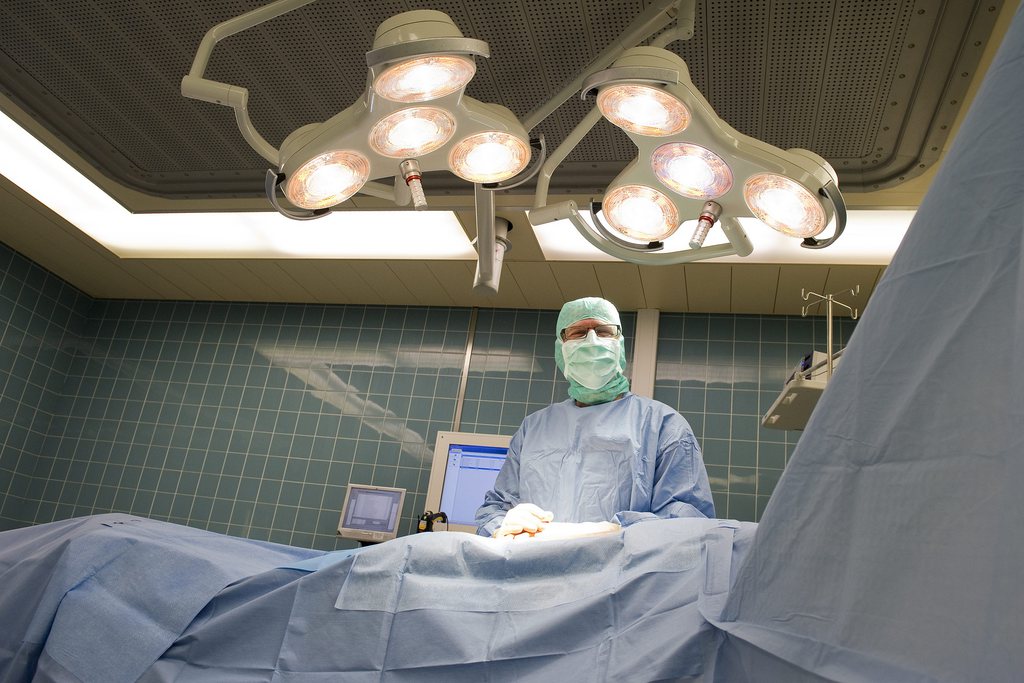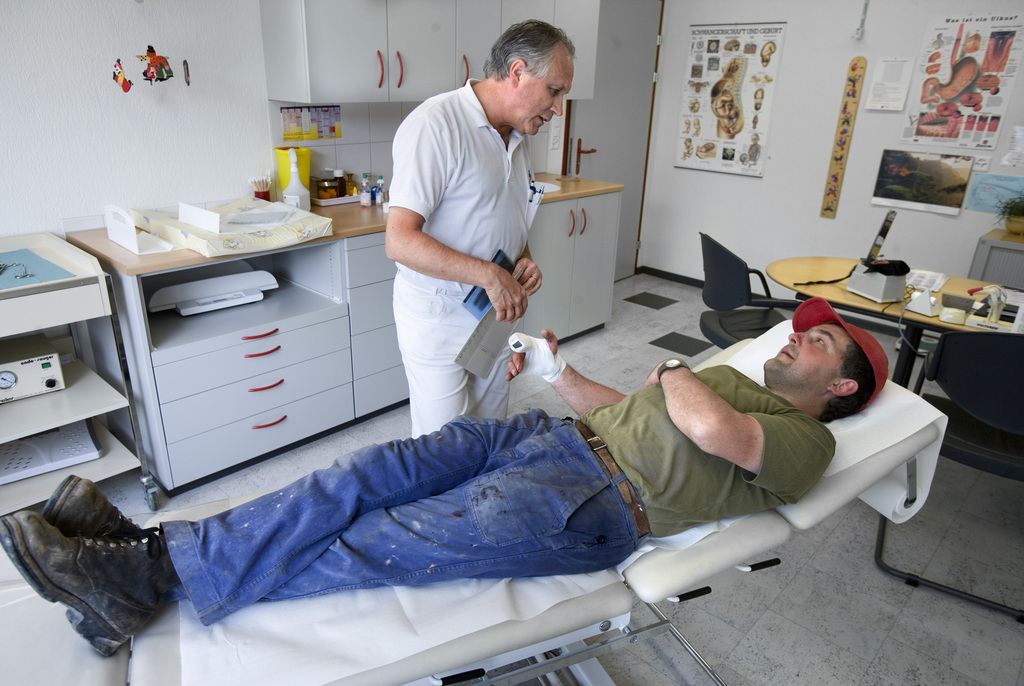Foreign doctors bail out Switzerland

In the wake of the accords with the European Union on the free movement of people, many EU physicians have been flocking to Switzerland, attracted by entrepreneurial freedom and well-paid positions – and the country has come to rely on them.
At the end of 2011, about a quarter of Switzerland’s 30,849 doctors had a foreign degree; more than four out of five from the EU, according to the Swiss Medical Association (FMH). Three quarters of all doctors who joined hospitals between 2002 and 2008 were foreign nationals, according to health monitoring body Obsan.
There is a shortage of general practitioners, psychiatrists and paediatricians because of the country’s restrictive policies. According to a poll commissioned by H+, the association representing Swiss hospitals, about two thirds of the 205 clinics surveyed are affected by a shortage of doctors with more than half considering the situation as “problematic”.
“The hospital sector relies on highly specialised professionals,” Bernhard Wegmüller of H+ told swissinfo.ch. “As Switzerland only trains a limited number of skilled personnel, the hospital sector – like other industries – depends on professionals from abroad.”
Particularly teaching hospitals like Bern’s Insel Hospital have trouble recruiting. “At our university hospital with an above-average share of patients with severe injuries and complicated diseases we must – even more than other clinics – recruit highly qualified specialists abroad,” spokesman Markus Hächler explained.
The Insel Hospital currently employs 5,822 Swiss nationals and 1,679 with foreign passports, mainly from EU countries. Almost two thirds of doctors and about four out of five nurses are Swiss, Hächler said.
More lucrative
The share of foreign doctors in the country exceeds 40 per cent in highly specialised disciplines such as heart surgery, neurosurgery, radiology, radio-oncology and nuclear medicine, FMH said. One of the obvious attractions of these fields of expertise is pay.
Heart specialists, gastroenterologists, neurosurgeons and radiologists are the top-paid doctors in Switzerland, earning about SFr400,000 ($427,000) per year, the Swiss Medical Association reported in 2008. In comparison, radiologists are the top earners in Germany netting about €264,000 (SFr319,000), €80,000 more than orthopaedists, the next-best-paid medical professionals, German statistics show.
For German doctors a move is not only more lucrative; many of them are also happy to leave the cumbersome bureaucracy, regulations and dwindling consultation times behind.
“Switzerland is attractive for German doctors because over here they have more entrepreneurial freedom and may offer additional services such as x-rays, lab work and self-dispensation,” said Hansruedi Federer, a management consultant specialised in the healthcare sector. “Their work is also well regarded and they have more consultation time.”
Since June 2002, when Switzerland started to accept EU diplomas, 2,651 EU doctors registered to open a practice in Switzerland, a third of all applications. Out of the 1,769 foreign degrees the health office recognised in the first nine months of 2012, almost half were from German physicians.
100-hour week
“We were disappointed by the ailing healthcare system, and the appalling working conditions for doctors in Germany,” said Nicola Berlemann, a GP who came to Switzerland with her husband – an orthopaedic surgeon – in 2004. “The work morale among colleagues was really low because even working 100 hours a week would not pay off.”
“In Germany, there is a lack of funds for research, to build up a patient base and provide adequate patient care,” Berlemann explained. “And, many doctors are frustrated about the two-tier medical system in Germany, where private patients are pampered, while panel patients draw the short straw.”
These foreign doctors may also be the remedy in rural areas where GPs have trouble finding successors. Without any influx, the country risks a crunch in about 15 years, when three out of four active practitioners will have retired, experts say. The situation is aggravated by the fact that graduates tend to opt for a specialisation because of better working hours, salaries and prestige.
There are individual initiatives that may help ease the problem. German doctor Thomas Eldner left Hamburg behind in 2002 to take over a GP’s surgery in Alpnach, a small town on the southern tip of Lake Lucerne, after becoming disgruntled with the German healthcare system. He founded Swiss-med-net, an organisation, which encourages and supports German doctors to follow his example.
Restrictive policies
In 1998, Switzerland introduced quotas at most medical faculties to lower the number of students. With 24 medical graduates per 1,000 active physicians, Switzerland comes fourth to last, according to an OECD report. Obsan warned in 2008 that doctors will not be able to handle about a third of consultations by 2030, if Switzerland does not train more doctors.
“A crucial problem is the fact that Switzerland trains fewer doctors than are required,” Wegmüller explained. “We would need about 1,200 medical graduates per year. At the moment there are only between 700 and 800.”
To make matters worse, parliament ten years ago imposed restrictions on new practices to curb the influx of EU doctors and stem rising healthcare costs.
After lifting admission restrictions again at the start of 2012, applications increased strongly, the Federal Health Office said. EU doctors applied for 43 per cent of the 1,542 new register numbers for new practices in the first nine months of the year, according to health insurance lobby Santésuisse.
This prompted Interior Minister Alain Berset in October to announce that cantons may again be able to restrict registrations from April 2013. Such a move would not only curtail the will of the people, it would also be fatal for the sector, Federer said. “Such restrictive policies would backfire, and the register numbers would once again end up being traded like farmer’s milk quotas.”
A moratorium on the establishment of new private practices came into force in July 2002. The goal was to prevent large numbers of doctors from the EU from immigrating to Switzerland, which had been made possible by the free movement of people accord with the EU.
Numbers from the first ten months since the moratorium was lifted indicate very strong interest from doctors in the EU. Due to the bilateral treaties with the EU, their diplomas are recognised in Switzerland. Applications have been made by 733 of these doctors, which amounts of 43 % of all applications.
However, that does not mean that all of these doctors came to Switzerland this year.
“It’s possible that some of them already work in hospitals or group practices in Switzerland,” said Anne Durrer, spokesperson for Santésuisse, the association of Swiss health insurers.
As of the end of October 2011, 1,868 doctors with foreign diplomas were working in Swiss practices. The majority comes from Germany (1,120), followed by Italy (185) and France (178).
At the end of 2011, Switzerland counted 30,849 doctors, 74% of them with a Swiss degree, 26% with a foreign degree, according to the Swiss Medical Association FMH. Of the 7,983 physicians from abroad, 84% are from a European Union country.
The 7,484 general practitioners specialised in internal medicine still account for the largest number of doctors established in Switzerland, followed by 4,999 physicians with no specialty and 3,063 psychiatrists and psychotherapists.
Physicians with their own practice earned about SFr230,000 on average, ranging from about SFr117,000 for paediatric psychiatry to SFr414,000 for neurosurgeons and SFr440,000 for specialised surgeons, according to a survey FMH conducted in 2008. Gastroenterologists earn around SFr393,000, while heart specialists and radiologists take home about SFr383,000.

In compliance with the JTI standards
More: SWI swissinfo.ch certified by the Journalism Trust Initiative










You can find an overview of ongoing debates with our journalists here . Please join us!
If you want to start a conversation about a topic raised in this article or want to report factual errors, email us at english@swissinfo.ch.